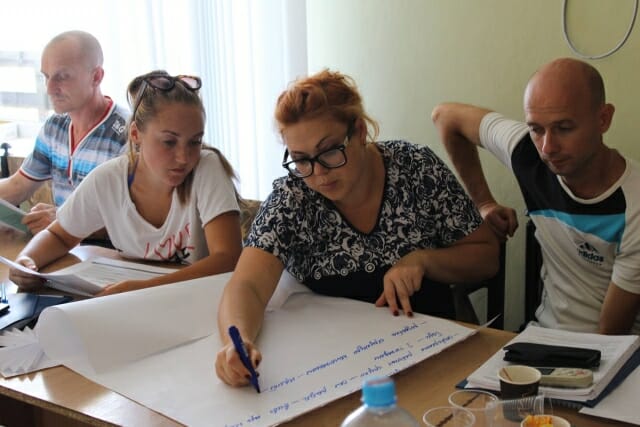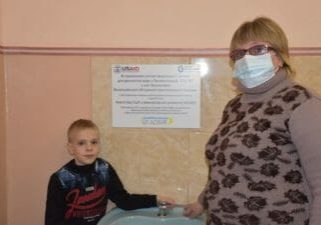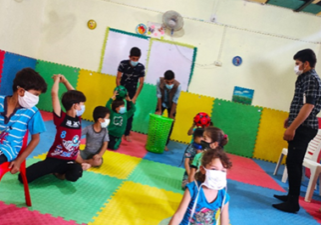News > Blog
Building Institutions, Building Trust: Three Important Lessons on Fighting Corruption through Decentralization in Ukraine
Published 12/08/2017 by globalcommunities

Building Institutions, Building Trust: Three Important Lessons on Fighting Corruption through Decentralization in Ukraine Anti-corruption training as part of the the DOBRE program.
By Yuliya Tkachuk, DOBRE Civic Engagement Expert
For many Ukrainians, the future of their country is linked with its fight against corruption. The government has made countless commitments to its people, international partners, and potential investors to create efficient corruption prevention mechanisms and institutions, but a host of scandals and failures at the national level have cast doubt on this effort. In spite of this, one overlooked area is showing progress in this fight — newly amalgamated communities that, thanks to the decentralization reform, have started building local governance systems and processes from scratch. Global Communities’ USAID-funded Decentralization Offering Better Results and Efficiency (DOBRE) program works with 50 amalgamated communities in seven oblasts across Ukraine, and has used this program as an entry point to incorporate corruption prevention mechanisms into the grassroots level and demonstrate how it is possible to create communities with reduced opportunity for corruption. I A 100-day pilot project implemented jointly with Public Partnership “For Transparent Local Budgets!” led by Odesa Committee of Voters, offered each community a menu of anti-corruption tools to adopt, as well as coaching on using the tools and developing necessary legislation. So far, the results have been positive, and provided three important lessons that can help expand the fight against corruption in Ukraine.
View and download this factsheet by clicking here.
1)The window of opportunity to act against corruption is a narrow one.
A newly created government entity such as an amalgamated community offers an environment to establish safeguards that make it difficult for local officials to misuse their power and funds. Newly selected community leaders are interested in earning trust of their citizens and in governing well to prove their capability to regional and national governments. Svitlana Spazheva, head of DOBRE-participant Pokrovska community, who attended training offered by the program, described her reasons: “I prefer to be open and transparent about ways I spend public money and let the community residents witness how the decisions are made and what struggles the government faces, rather than have to answer millions of their questions and deal with tension. Anti-corruption tools make me feel safer.” It is much easier not to let corrupt practices conquer a community than try to rid them from a community, especially when a city mayor or a village head has been in office for decades, does not have any competitors, and shares illegally earned profits with superiors.
Also, because community budgets grow from year to year, the absence of safeguards allows local officials to benefit from misuse of funds. DOBRE discovered that the poorer the community is, the more receptive it is to adopting anti-corruption tools. Several of them introduced twice as many tools as the project encouraged. Community leadership feels they have nothing to lose by introducing a control system, because the financial stakes are quite modest.
On the other side of the spectrum, rich communities expressed the most resistance to introducing any tools to prevent corruption. The two wealthiest communities from DOBRE cohort refused to adopt any tools. “It’s not important for us, we do not need them,” says one community head. They feel they do not need to worry about the misuse of funds because they have plenty of money. While the shortsightedness of the first kind plays in favor of fighting corruption, the shortsightedness of the second could come back to haunt them when they face difficulties attracting investment because of lack of oversight. Thus, a corruption fight has more chances to succeed if assistance with oversight and internal control systems comes to a community sooner rather than later.
2)Local governments, with rare exceptions, have very little knowledge on how to prevent corruption and even well-intentioned leadership can face consequences that would undermine public trust.
For this reason, each community needs to develop and adopt a set of legislative documents that launch corruption prevention practices. First they need to find experts to draft those documents. The first or second year in office brings so many urgent tasks to community leadership, that efficient assistance would mean supplying the communities with templates pre-developed by experts who not only know the legislation, but also understand local context and the specific needs of each community. For example, many municipalities create enterprises that provide basic services like water, electricity, and solid waste management. To ensure they work transparently and that residents have a way to oversee the quality of services, a good step for such a community would be to create a public advisory board that oversees hiring and contracting, brings in feedback about the quality of services, and informs on urgent needs. Not many communities may know that such an oversight mechanism can work to the benefit of both local government and residents engaging in public oversight.
Dmytro Ivaniuk, head of Biloberizka community, noted the newness of this tool “We had no problems passing this tool by the council,” he says. “Because this is exactly what we need to make sure we create a new municipal entity as it should be.” Another example is a conflict of interest policy, which turned out to be the most popular anti-corruption tool for DOBRE communities: 14 out of 25 developed and adopted the policy as their first measure of preventing corruption. Ukraine adopted regulations on conflicts of interests relatively recently, but neither local elected officials nor the executive staff on communities know what it means and how to address it. Often, local officials face charges and pay fines due to ignorance of this law. “Council members used to vote on issues where they had conflict of interest. They did not even think about this before the trainings,” says Natalia Ozerianska, deputy head of Oleksandrivska community.
Rumors about repercussions frequently circulate and make local officials reluctant to make decisions and execute the powers vested in them, but after they learn what conflict of interest is and how to address it, the decision making becomes easier. The head of Kochubeivska community mentioned that voting is now less dramatic: “[After the training] our council members know what it is and instead of missing the council meetings, they come to vote. They say if they have a conflict of interest and abstain from discussion and voting for that one issue,” says this official. Thus, to reach goals, anti-corruption messaging and expertise needs not to scare the officials but explain the benefits that adoption of corruption prevention mechanisms bring to people with power and to their communities.
3) Corruption prevention has no single owner; all stakeholders must do their parts.
Initially, DOBRE planned to focus corruption prevention assistance on active citizens and local civil society organizations. However, introductory discussions with community residents and leaders concluded that all key stakeholders should be involved — community leadership (head or deputy heads), council members, executive officials, settlement representatives (starostas), opinion leaders, local businesses, and activists. The reason is that focusing just on civil society absent mechanisms to oversee governance and spending makes little sense. In order to launch those mechanisms, elected and appointed officials need to buy into the process. In addition, external experts and coaches plays an instrumental role by bringing the missing expertise and guiding the community. “The anti-corruption board established in our community consists of representatives of each settlement, including people who know the laws and regulations. These are active citizens who will convene for monthly meetings and work for real, not just to check the box,” says Victoria Bahriy, chief lawyer of Verkhnianska community. The council members of Oleksandrivska community were eager to join their anti-corruption board, which was ultimately comprised of working groups that met and discussed all the details, and decided to extend the board membership to include citizens and council members who expressed interest in working side by side. The corruption prevention teams of local officials, activists, and experts have the power to make the necessary regulations work, and prevent sabotage of the adopted regulations or silencing of key issues.
Moreover, for the program to deliver sustainable results, local awareness campaigns and citizen engagement are crucial next steps. All newly adopted regulations and corruption prevention tools will only be on paper if community residents are not aware of them or do not know how to use them. Keeping up with the standards of good governance means that officials actively seek citizen input in decision making, and provide transparency of all processes connected to budgets and assets. Such an approach minimizes opportunity for corruption, but brings even more value. In the words of deputy head of Oleksandrivska community Ozerianska: “Desire to work transparently and availability of corruption prevention mechanisms is very important. A modern community cannot survive without these, because these things bring people and their government closer to each other. It is a way to raise trust of citizens in their leaders.”






